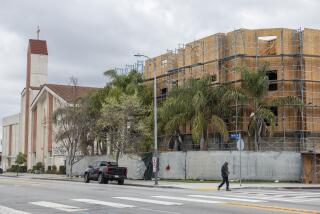Storm of Concern on Prop. 218
- Share via
Californians are struggling to come to grips with the 1996 passage of Proposition 218, an initiative with results that may be more than we bargained for. Now is the time for the Legislature to clarify its provisions.
Proposition 218 is a constitutional amendment retroactive to January 1995. It targets all municipal levies, including general taxes, fees for public services and special property assessments imposed to fund services ranging from police and fire protection to libraries and parks. Specifically, the new law requires local governments to win approval from a majority of voters before increasing or continuing many of these levies and before imposing new ones.
Proposition 218 will affect many more than the 30% of the state’s registered voters who provided the margin that carried it to passage. The idea behind the initiative was simple and apparently compelling: Local government bodies have abused taxpayers, funding all manner of things by instituting levies instead of carving the needed monies out of general fund budgets. But what looks simple on paper is in reality far more complicated--and severe.
Officials in the Orange County city of Stanton have had to trim the municipal bureaucracy. Many city services have been privatized, and street repairs and needed improvements for parks are on hold. Facing a budget shortfall of $300,000 to $350,000, Stanton officials may now have to go to the voters to try to raise funds to prevent cuts in firefighting and police protection, a hurdle the City Council would not have faced before the passage of 218.
Alhambra officials expect a $2.2-million budget hit from 218’s ban on council-ordered levies, and they have a problem. The next municipal elections are two years away, so city officials figure they have to make cuts now. On the table: having a private firm run the jail and contracting with the county for fire protection.
Anaheim has just become the fifth California city to suffer a downgrading of its credit rating since the passage of 218. That is a clear sign of Wall Street’s uneasiness with limits on local authorities’ abilities to raise taxes.
In Los Angeles County and city, many aspects of Proposition 218 are unclear. County officials have gone to court, for example, seeking a ruling on whether its Fire Suppression Benefit Assessment District, budgeted at $53 million, can continue in its present form, but the county’s own analysis casts doubt on the possibility of such a continuation.
Los Angeles city officials have placed a business tax on the April ballot, and they say that assessments for sidewalks, streets and sewer, water, flood control and drainage systems are exempt from 218’s requirements. But attempts to raise so-called special benefit monies must now meet a test: that the parcels being charged receive a benefit that is proportional to the cost of raising the funds. City officials say they don’t know whether an appraisal or an actual calculation of the special benefit for each parcel of land is required. And governmental bodies throughout California must be equally confused.
The Legislature should step forward and set standards for exactly what local governments are required to demonstrate under Proposition 218. Many areas are undefined, and that’s a further complication that confronts localities. Such are the burdens of California’s treasured but treacherous initiative process.
More to Read
Sign up for Essential California
The most important California stories and recommendations in your inbox every morning.
You may occasionally receive promotional content from the Los Angeles Times.










